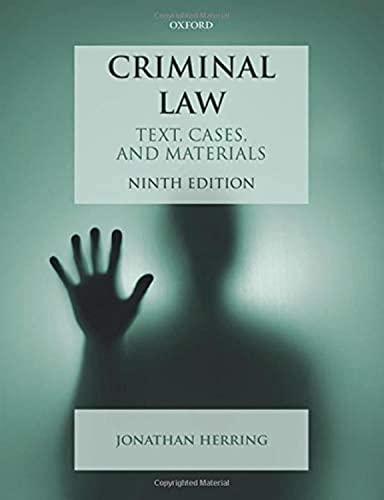Question
Using your computer or podcast player (iTunes, Google Play, Spotify, etc.) listen toAll Due Respect, Part 1 from The Briefing Room podcast. (This particular podcast
Using your computer or podcast player (iTunes, Google Play, Spotify, etc.) listen to"All Due Respect, Part 1" from The Briefing Room podcast.
(This particular podcast has a written transcript of theepisodeand it can be found by following the link above.)
You are not required to cite information from the podcast, but please cite any information used to answer questions from any other sources.
Cops and defense attorneys sit on opposite sides in the courtroom. So, what happens when you put them at the same table? In today's briefing, we find out. Detective Dave welcomes Public Defender Lissa to talk about why she left the prosecutor's office to become a defender of the accused, how she does her job, and what she feels is the common ground in the fight for justice - hint, it's spelled r-e-s-p-e-c-t.
After you have listened to the episode, please answer the following questions in full sentences/paragraphs:
- What was Lissa's path to becoming a defense attorney? What type of defense work does she do?
- What are the constraints in what she can discuss?
- How does she explain how she defends potentially guilty persons?
- Why did she leave the prosecutor's office and move to being a defense attorney? What are the benefits from having experience on both sides?
- How does Dan work with other agencies when suspects cross jurisdiction lines?
- What role does the social contract have in the discussion of corruption in policing?
- What type of relationship between police and defense attorneys is beneficial to everyone? Give an example from the podcast. What about a relationship that is NOT a good one? Give an example from the podcast.
- How does Lissa get a case and then start her defense game plan?
- Is there anything in the assessment of a case that Lissa sees as a "red flag" and won't take a case?
- What is Lissa's approach to meeting with a new client to decide what she can and can't do for them?
- How does Lissa prep a client for a plea bargain and then have a discussion about it when it does come in?
- How does her approach change when reading certain police reports that she knows aren't going to be as thorough as other reports?
- What is the Judge's instructions when a verdict is being read?
- What does Lissa see as her biggest victories?
- How does justice occur, in her opinion?
Step by Step Solution
There are 3 Steps involved in it
Step: 1

Get Instant Access to Expert-Tailored Solutions
See step-by-step solutions with expert insights and AI powered tools for academic success
Step: 2

Step: 3

Ace Your Homework with AI
Get the answers you need in no time with our AI-driven, step-by-step assistance
Get Started


